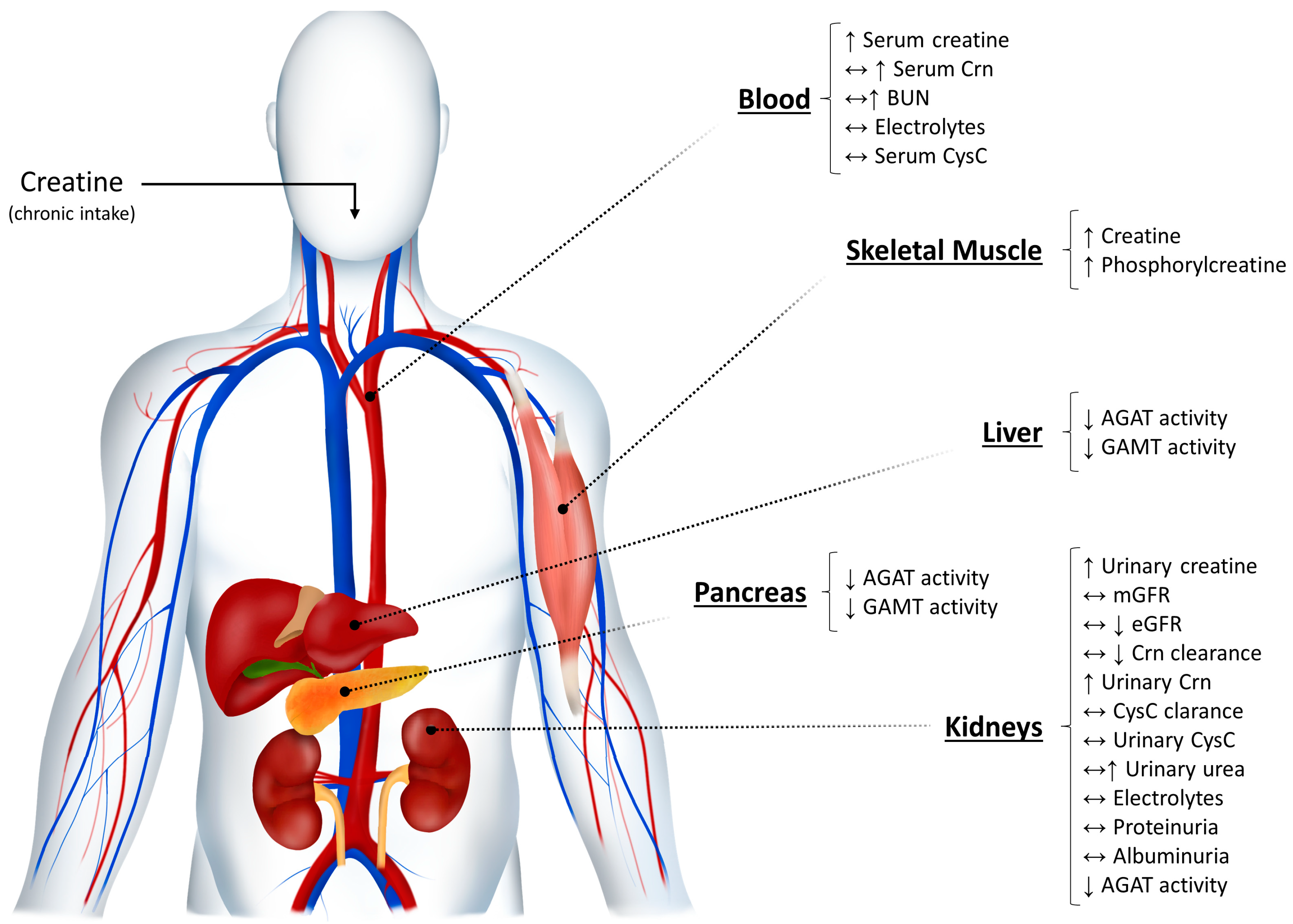What is the Difference between Creatine And Creatinine? Creatine is used as a source of energy for the muscles, while creatinine is a waste product filtered out of the body. Creatinine levels measure kidney function, while creatine levels determine muscle health.
Creatine and creatinine are often confused due to their similar names, but they serve different roles within the body. Creatine is a naturally occurring compound that plays a vital role in providing energy to muscles during high-intensity activities. On the other hand, creatinine is a waste product generated from the breakdown of creatine in muscles and filtered out by the kidneys.
Understanding the distinction between these two compounds is crucial for individuals seeking to optimize their health and athletic performance. We will delve deeper into the disparities between creatine and creatinine and how they impact the body’s overall function.

Chemical Structure
Creatine and creatinine serve distinct roles in the body: creatine acts as energy for muscles, while creatinine is a waste product eliminated by the body. Creatinine levels indicate kidney function, while creatine levels reflect muscle health. Understanding the difference between these two compounds is crucial for overall health and fitness.
Creatine Structure
Creatine, a widely used supplement for athletes, bodybuilders, and fitness enthusiasts, belongs to the class of nitrogenous organic acids. Its chemical structure consists of three amino acids – arginine, glycine, and methionine. Being an amino acid derivative, creatine plays a crucial role in providing energy to the muscles during high-intensity exercises.
Creatinine Structure
Creatinine, on the other hand, is not a dietary supplement but rather a waste product produced by the body’s muscles as a result of normal metabolic processes. It is a byproduct of creatine metabolism and is excreted in the urine. The chemical structure of creatinine is similar to that of creatine but lacks the methyl group present in creatine. This slight difference in structure makes creatinine a waste product, unlike creatine which serves as an important energy source for the muscles.
So, to recap, creatine is a nitrogenous organic acid formed from arginine, glycine, and methionine, while creatinine is a waste product derived from the metabolism of creatine.

Credit: www.mdpi.com
Sources And Production
Creatine and creatinine are two important compounds in the body that are often confused due to their similar names. Understanding the sources and production of these compounds can shed light on their differences and roles in the body. Let’s delve into the natural sources of creatine and the formation of creatinine in the body to comprehend these crucial distinctions.
Natural Sources Of Creatine
Creatine is a naturally occurring compound predominantly found in animal products such as meat and fish. It is also synthesized in the liver, pancreas, and kidneys. The body can produce about half of the required creatine, while the rest is obtained through the diet. Incorporating creatine-rich foods into your meals can contribute to the body’s creatine pool, supporting various bodily functions, including muscle energy production and neurological health.
Formation Of Creatinine In The Body
Creatinine is formed in the body as a byproduct of creatine metabolism. When creatine is used as a source of energy in the muscles, it undergoes conversion to creatinine, which is eventually excreted by the kidneys. Thus, creatinine levels in the blood can serve as an indicator of kidney function, with elevated levels potentially signaling underlying kidney issues. Understanding the interplay between creatine and creatinine is pivotal in comprehending muscle health and kidney function.
Function In The Body
Understanding the difference between creatine and creatinine is crucial for better comprehension of their function in the body. Both substances are vital for our health, but they serve different roles.
Roles Of Creatine In Energy Production
Creatine is a naturally occurring compound primarily found in the muscles. It plays a pivotal role in energy production during high-intensity, short-duration activities. By aiding in the regeneration of adenosine triphosphate (ATP), the body’s primary energy source, creatine supports enhanced muscle performance and strength. Moreover, it facilitates the synthesis of protein, which is essential for muscle growth and repair.
Role Of Creatinine In Waste Removal
Unlike creatine, creatinine is a byproduct of creatine metabolism. It is produced in the muscles and then carried in the bloodstream to the kidneys to be filtered out of the body. Creatinine serves as an indicator of kidney function and its levels in the blood are used to assess the efficiency of waste removal from the body. Elevated creatinine levels can signify impaired kidney function, leading to various health complications.

Credit: www.researchgate.net
Medical Significance
The difference between creatine and creatinine has significant medical implications. While creatine is commonly used as a supplement for performance enhancement, creatinine plays a crucial role in kidney function and overall health.
Creatine In Supplements And Performance Enhancement
Creatine is a compound naturally produced by the body, mainly found in muscles. It plays a vital role in providing energy to the muscles during high-intensity exercises. Due to its performance-enhancing properties, creatine has gained popularity as a dietary supplement among athletes and fitness enthusiasts.
Using creatine supplements may help individuals increase their muscle strength, power, and overall performance during intense physical activities. It aids in enhancing muscle volume by increasing the water content within muscle cells, resulting in improved strength and endurance.
Popular creatine supplements include:
- BulkSupplements Creatine Monohydrate
- Thorne Creatine
- Optimum Nutrition Creatine Powder
- GNC Pro Performance Creatine Monohydrate
- Transparent Labs Creatine HMB
- Optimum Nutrition Creatine Capsules
Creatinine In Kidney Function And Health
Creatinine, on the other hand, is a waste product formed from the breakdown of creatine in the muscles. It is primarily filtered out of the body through the kidneys and excreted in urine. The level of creatinine in the blood is a crucial indicator of kidney function.
Monitoring creatinine levels can help diagnose and monitor various kidney conditions, such as chronic kidney disease. Elevated creatinine levels in the blood may indicate impaired kidney function, as the kidneys are responsible for removing creatinine from the body. Regular kidney function tests often include measuring creatinine levels to assess overall kidney health.
It’s important to maintain healthy creatinine levels for optimal kidney function and overall well-being. Some methods to support kidney health include:
- Avoiding excessive intake of creatine supplements, as they can increase creatinine levels.
- Using medications only under professional guidance, as certain medications may elevate creatinine levels.
- Adopting a balanced diet that includes foods beneficial for kidney health, such as fruits, vegetables, and whole grains.
- Staying well-hydrated to support proper kidney function.
- Regular exercise and maintaining a healthy weight.
Understanding the difference between creatine and creatinine is crucial for individuals considering creatine supplementation and for those concerned about their kidney health. While creatine helps boost performance, creatinine serves as an essential marker of kidney function and overall health.
Frequently Asked Questions On What Is The Difference Between Creatine And Creatinine
Is Creatinine And Creatine Same?
Does Taking Creatine Increase Creatinine Levels?
What Happens If Creatinine Is High?
How Can I Raise My Creatinine Level?
Conclusion
Overall, understanding the difference between creatine and creatinine is essential for individuals looking to optimize their muscle health and kidney function. Creatine serves as a source of energy for muscles, while creatinine is a waste product filtered out of the body.
Monitoring creatinine levels can provide insights into kidney health, while creatine levels indicate muscle health. It is important to consider these distinctions when considering creatine supplementation or assessing kidney function. By understanding the unique roles of creatine and creatinine, individuals can make informed decisions to support their overall well-being.